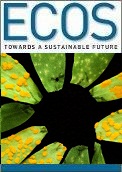
|
Published: 19 December 2011
Virgin in venture that could seed local bio-crude industry
The Australian operations of two global companies, Virgin Airlines and paper company Norske Skog, have expressed strong interest in an Australian invention that can turn waste biomass into refinery-ready bio-crude oil within 30 minutes.

|
|
The joint venture is developing a commercial-scale process for transforming biomass waste, such as rice husks, into bio-crude oil. Credit:
CSIRO
|
Virgin Australia has signed an agreement with the company behind the technology, Licella, to explore the potential of the new proprietary technology – called catalytic hydrothermal reaction (CAT-HTR) – to sustainably produce jet aviation fuel.
The associated joint venture, Licella Fibre Fuels (LFF), has the exclusive global license to CAT-HTR technology, which is capable of producing bio-crude oil from multiple biomass feedstocks, such as forestry residues, agricultural waste and energy crops.
The Australian Government’s Minister for Resources, Energy and Tourism, Martin Ferguson, announced the signing of the joint venture agreement. Licella’s demonstration plant in NSW was partially funded by the Federal Government’s Second Generation Biofuels Research and Development Grant Program.
The partners say the technology – tested over three years in pilot and demonstration facilities – could form the basis of a ‘second generation’ commercial bio-crude oil production plant in either Australia or New Zealand, with subsequent global expansion.
Bio-crude oil is a renewable equivalent of fossil crude oil. CAT-HTR has the benefit of being able to be dropped into existing refinery infrastructure.
According to Licella, the first commercial-scale plant could produce up to 500 000 barrels of bio-crude a year. This would be further refined into second-generation biofuels such as petrol, diesel and jet fuel.
Second-generation biofuels do not rely upon food crops as production feedstock and are widely regarded a viable near-term supplement to petrochemical refineries’ dependency on imported fossil fuel products.
Licella anticipates the CO2 life cycle emissions from the bio-crude oil will be 60 per cent less than fossil fuels.
‘By pioneering the use of water technology, Licella’s CAT-HTR offers a cleaner, faster and more cost-effective alternative to processing biomass that is the first of its kind in the world,’ said Virgin Australia’s Sean Donohue.
Virgin is collaborating with a number of interested parties to research and develop bio-derived renewable fuels that could progressively replace conventional aviation fuels.
‘Virgin Australia’s strategy on sustainable aviation fuel is to work with a range of stakeholders across the industry,’ said Donohue. ‘We know there will be no magic bullet and that creating financially viable biofuel will involve a range of feedstocks and processes.’
Licella’s parent company, Ignite Energy, says Licella will become an independent entity that will continue to exclusively focus on the commercialisation of bio-crude production projects in the Australasian region and around the world.
Source: Licella



